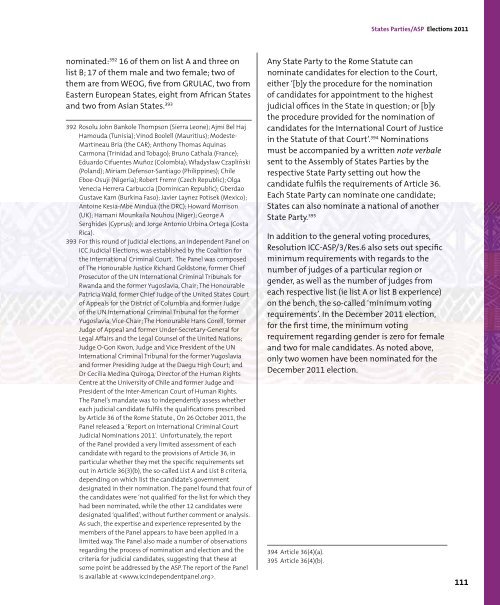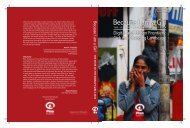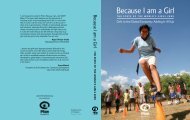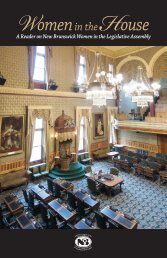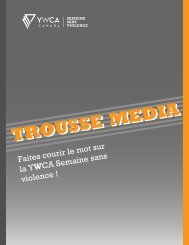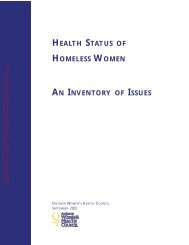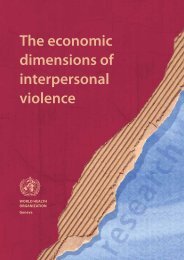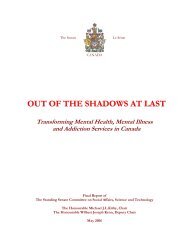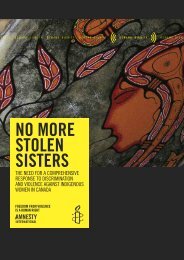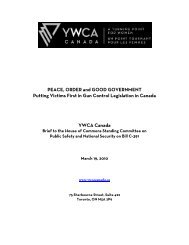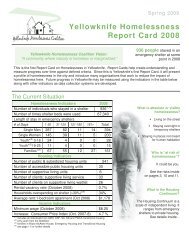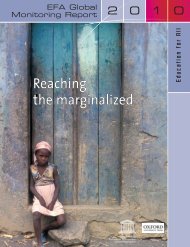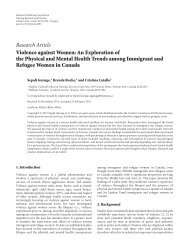Gender Report Card on the International Criminal ... - YWCA Canada
Gender Report Card on the International Criminal ... - YWCA Canada
Gender Report Card on the International Criminal ... - YWCA Canada
You also want an ePaper? Increase the reach of your titles
YUMPU automatically turns print PDFs into web optimized ePapers that Google loves.
States Parties/ASP Electi<strong>on</strong>s 2011<br />
nominated: 392 16 of <strong>the</strong>m <strong>on</strong> list A and three <strong>on</strong><br />
list B; 17 of <strong>the</strong>m male and two female; two of<br />
<strong>the</strong>m are from WEOG, five from GRULAC, two from<br />
Eastern European States, eight from African States<br />
and two from Asian States. 393<br />
392 Rosolu John Bankole Thomps<strong>on</strong> (Sierra Le<strong>on</strong>e); Ajmi Bel Haj<br />
Hamouda (Tunisia); Vinod Boolell (Mauritius); Modeste-<br />
Martineau Bria (<strong>the</strong> CAR); Anth<strong>on</strong>y Thomas Aquinas<br />
Carm<strong>on</strong>a (Trinidad and Tobago); Bruno Cathala (France);<br />
Eduardo Cifuentes Muñoz (Colombia); Władysław Czaplinski ´<br />
(Poland); Miriam Defensor-Santiago (Philippines); Chile<br />
Eboe-Osuji (Nigeria); Robert Fremr (Czech Republic); Olga<br />
Venecia Herrera Carbuccia (Dominican Republic); Gberdao<br />
Gustave Kam (Burkina Faso); Javier Laynez Potisek (Mexico);<br />
Antoine Kesia-Mbe Mindua (<strong>the</strong> DRC); Howard Morris<strong>on</strong><br />
(UK); Hamani Mounkaila Nouhou (Niger); George A<br />
Serghides (Cyprus); and Jorge Ant<strong>on</strong>io Urbina Ortega (Costa<br />
Rica).<br />
393 For this round of judicial electi<strong>on</strong>s, an Independent Panel <strong>on</strong><br />
ICC Judicial Electi<strong>on</strong>s, was established by <strong>the</strong> Coaliti<strong>on</strong> for<br />
<strong>the</strong> Internati<strong>on</strong>al <strong>Criminal</strong> Court. The Panel was composed<br />
of The H<strong>on</strong>ourable Justice Richard Goldst<strong>on</strong>e, former Chief<br />
Prosecutor of <strong>the</strong> UN Internati<strong>on</strong>al <strong>Criminal</strong> Tribunals for<br />
Rwanda and <strong>the</strong> former Yugoslavia, Chair; The H<strong>on</strong>ourable<br />
Patricia Wald, former Chief Judge of <strong>the</strong> United States Court<br />
of Appeals for <strong>the</strong> District of Columbia and former Judge<br />
of <strong>the</strong> UN Internati<strong>on</strong>al <strong>Criminal</strong> Tribunal for <strong>the</strong> former<br />
Yugoslavia, Vice-Chair; The H<strong>on</strong>ourable Hans Corell, former<br />
Judge of Appeal and former Under-Secretary-General for<br />
Legal Affairs and <strong>the</strong> Legal Counsel of <strong>the</strong> United Nati<strong>on</strong>s;<br />
Judge O-G<strong>on</strong> Kw<strong>on</strong>, Judge and Vice President of <strong>the</strong> UN<br />
Internati<strong>on</strong>al <strong>Criminal</strong> Tribunal for <strong>the</strong> former Yugoslavia<br />
and former Presiding Judge at <strong>the</strong> Daegu High Court; and<br />
Dr Cecilia Medina Quiroga, Director of <strong>the</strong> Human Rights<br />
Centre at <strong>the</strong> University of Chile and former Judge and<br />
President of <strong>the</strong> Inter-American Court of Human Rights.<br />
The Panel’s mandate was to independently assess whe<strong>the</strong>r<br />
each judicial candidate fulfils <strong>the</strong> qualificati<strong>on</strong>s prescribed<br />
by Article 36 of <strong>the</strong> Rome Statute., On 26 October 2011, <strong>the</strong><br />
Panel released a ‘<str<strong>on</strong>g>Report</str<strong>on</strong>g> <strong>on</strong> Internati<strong>on</strong>al <strong>Criminal</strong> Court<br />
Judicial Nominati<strong>on</strong>s 2011’. Unfortunately, <strong>the</strong> report<br />
of <strong>the</strong> Panel provided a very limited assessment of each<br />
candidate with regard to <strong>the</strong> provisi<strong>on</strong>s of Article 36, in<br />
particular whe<strong>the</strong>r <strong>the</strong>y met <strong>the</strong> specific requirements set<br />
out in Article 36(3)(b), <strong>the</strong> so-called List A and List B criteria,<br />
depending <strong>on</strong> which list <strong>the</strong> candidate’s government<br />
designated in <strong>the</strong>ir nominati<strong>on</strong>. The panel found that four of<br />
<strong>the</strong> candidates were ‘not qualified’ for <strong>the</strong> list for which <strong>the</strong>y<br />
had been nominated, while <strong>the</strong> o<strong>the</strong>r 12 candidates were<br />
designated ‘qualified’, without fur<strong>the</strong>r comment or analysis.<br />
As such, <strong>the</strong> expertise and experience represented by <strong>the</strong><br />
members of <strong>the</strong> Panel appears to have been applied in a<br />
limited way. The Panel also made a number of observati<strong>on</strong>s<br />
regarding <strong>the</strong> process of nominati<strong>on</strong> and electi<strong>on</strong> and <strong>the</strong><br />
criteria for judicial candidates, suggesting that <strong>the</strong>se at<br />
some point be addressed by <strong>the</strong> ASP. The report of <strong>the</strong> Panel<br />
is available at .<br />
Any State Party to <strong>the</strong> Rome Statute can<br />
nominate candidates for electi<strong>on</strong> to <strong>the</strong> Court,<br />
ei<strong>the</strong>r ‘[b]y <strong>the</strong> procedure for <strong>the</strong> nominati<strong>on</strong><br />
of candidates for appointment to <strong>the</strong> highest<br />
judicial offices in <strong>the</strong> State in questi<strong>on</strong>; or [b]y<br />
<strong>the</strong> procedure provided for <strong>the</strong> nominati<strong>on</strong> of<br />
candidates for <strong>the</strong> Internati<strong>on</strong>al Court of Justice<br />
in <strong>the</strong> Statute of that Court’. 394 Nominati<strong>on</strong>s<br />
must be accompanied by a written note verbale<br />
sent to <strong>the</strong> Assembly of States Parties by <strong>the</strong><br />
respective State Party setting out how <strong>the</strong><br />
candidate fulfils <strong>the</strong> requirements of Article 36.<br />
Each State Party can nominate <strong>on</strong>e candidate;<br />
States can also nominate a nati<strong>on</strong>al of ano<strong>the</strong>r<br />
State Party. 395<br />
In additi<strong>on</strong> to <strong>the</strong> general voting procedures,<br />
Resoluti<strong>on</strong> ICC-ASP/3/Res.6 also sets out specific<br />
minimum requirements with regards to <strong>the</strong><br />
number of judges of a particular regi<strong>on</strong> or<br />
gender, as well as <strong>the</strong> number of judges from<br />
each respective list (ie list A or list B experience)<br />
<strong>on</strong> <strong>the</strong> bench, <strong>the</strong> so-called ‘minimum voting<br />
requirements’. In <strong>the</strong> December 2011 electi<strong>on</strong>,<br />
for <strong>the</strong> first time, <strong>the</strong> minimum voting<br />
requirement regarding gender is zero for female<br />
and two for male candidates. As noted above,<br />
<strong>on</strong>ly two women have been nominated for <strong>the</strong><br />
December 2011 electi<strong>on</strong>.<br />
394 Article 36(4)(a).<br />
395 Article 36(4)(b).<br />
111


